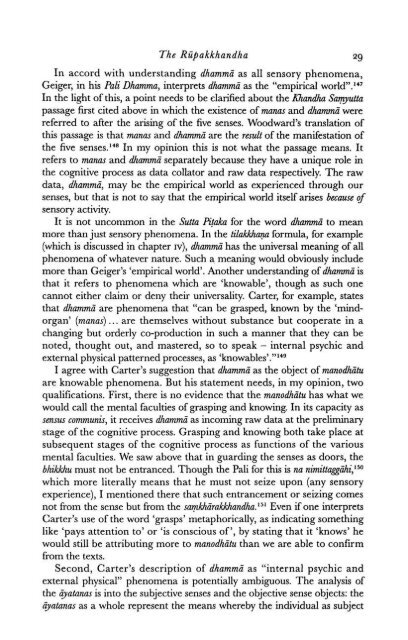Identity and Experience_Hamilton_1996
Identity and Experience_Hamilton_1996
Identity and Experience_Hamilton_1996
Create successful ePaper yourself
Turn your PDF publications into a flip-book with our unique Google optimized e-Paper software.
The Riipakkh<strong>and</strong>ha 29<br />
In accord with underst<strong>and</strong>ing dhammi as all sensory phenomena,<br />
Geiger, in his Pali Dhamma, interprets dhammi as the "empirical world".'47<br />
In the light of this, a point needs to be clarified about the m<strong>and</strong>ha Samyutta<br />
passage first cited above in which the existence of manas <strong>and</strong> dhammi were<br />
referred to after the arising of the five senses. Woodward's translation of<br />
this passage is that manas <strong>and</strong> dhammi are the result of the manifestation of<br />
the five senses.'48 In my opinion this is not. what the passage means. It<br />
refers to manas <strong>and</strong> dhammii separately because they have a unique role in<br />
the cognitive process as data collator <strong>and</strong> raw data respectively. The raw<br />
data, dhamma, may be the empirical world as experienced through our<br />
senses, but that is not to say that the empirical world itself arises because of<br />
sensory activity.<br />
It is not uncommon in the Sutta Pitaka for the word dhammii to mean<br />
more than just sensory phenomena. In the tilakkha?~ formula, for example<br />
(which is discussed in chapter IV), &ammi has the universal meaning of all<br />
phenomena of whatever nature. Such a meaning would obviously include<br />
more than Geiger's 'empirical world'. Another underst<strong>and</strong>ing of dhammii is<br />
that it refers to phenomena which are 'knowable', though as such one<br />
cannot either claim or deny their universality. Carter, for example, states<br />
that dhammi are phenomena that "can be grasped, known by the 'mindorgan'<br />
(manas). . . are themselves without substance but cooperate in a<br />
changing but orderly co-production in such a manner that they can be<br />
noted, thought out, <strong>and</strong> mastered, so to speak - internal psychic <strong>and</strong><br />
external physical patterned processes, as knowa able^'."'^^<br />
I agree with Carter's suggestion that dhammii as the object of manodhitu<br />
are knowable phenomena. But his statement needs, in my opinion, two<br />
qualifications. First, there is no evidence that the manodhiitu has what we<br />
would call the mental faculties of grasping <strong>and</strong> knowing. In its capacity as<br />
sensus communis, it receives dhammi as incoming raw data at the preliminary<br />
stage of the cognitive process. Grasping <strong>and</strong> knowing both take place at<br />
subsequent stages of the cognitive process as functions of the various<br />
mental faculties. We saw above that in guarding the senses as doors, the<br />
bhikkhu must not be entranced. Though the Pali for this is na nimittagczhi,150<br />
which more literally means that he must not seize upon (any sensory<br />
experience), I mentioned there that such entrancement or seizing comes<br />
not from the sense but from the ~amkhirakkh<strong>and</strong>ha.'~' Even if one interprets<br />
Carter's use of the word 'grasps' metaphorically, as indicating something<br />
like 'pays attention to' or 'is conscious of', by stating that it 'knows' he<br />
would still be attributing more to manodhitu than we are able to confirm<br />
from the texts.<br />
Second, Carter's description of dhammi as "internal psychic <strong>and</strong><br />
external physical" phenomena is potentially ambiguous. The analysis of<br />
the @atanas is into the subjective senses <strong>and</strong> the objective sense objects: the<br />
@atanas as a whole represent the means whereby the individual as subject


